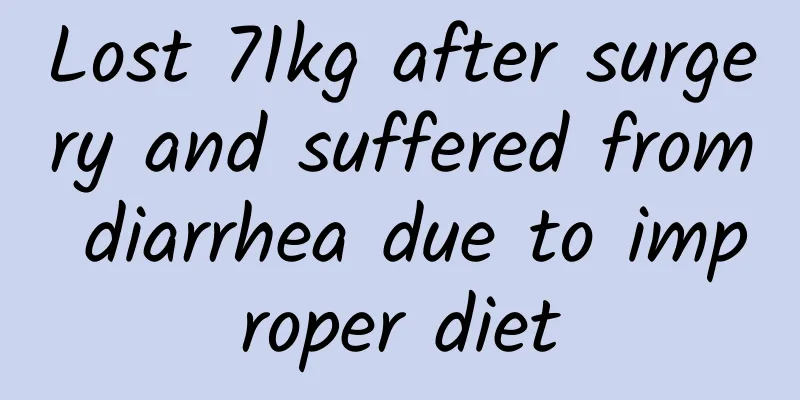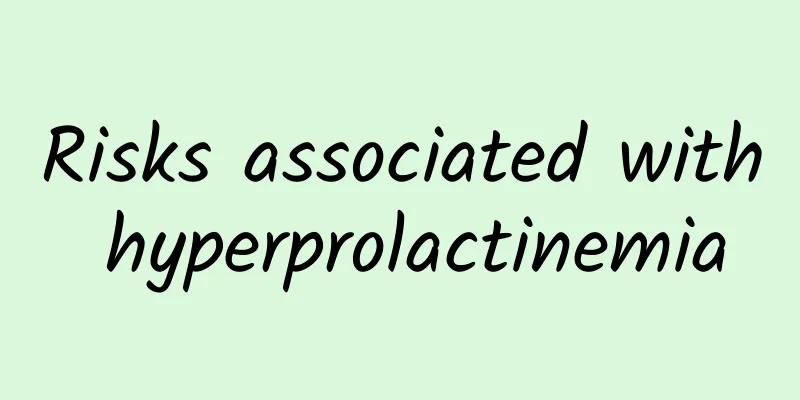Lost 71kg after surgery and suffered from diarrhea due to improper diet

|
Gastric bariatric surgery can accelerate weight loss and help obese people regain their health, but if improper nutritional care is taken after the operation, it may harm your health! Mr. Wu, a 24-year-old master's student, weighed 161.2 kg and had a BMI of 53.2 before weight loss. He had been suffering from morbid obesity for a long time. One year after undergoing weight loss surgery, he lost 71.6 kg and his BMI dropped to 29.6. However, due to improper diet control after the operation, he developed symptoms such as gastroesophageal reflux, vomiting, and diarrhea. The main causes of obesity, apart from genetic factors, are unhealthy diet and lifestyle. This image is a simulation only. After the weight loss surgery, this patient ate out for every meal, and his staple food was fried high-fat food with 1000c.c. of Coke. Due to the heavy academic pressure, he often went to bed at dawn and relied on food to relieve stress. His total daily food intake was 2 to 3 times that of usual. In addition, he had no exercise habits and ate quickly, which led to continuous physical discomfort. It was not until the intervention of a nutritionist that the sequelae of digestive tract discomfort were improved. Prevent chronic nutritional deficiencies! Proper nutritional supplementation after weight loss surgery Li Guoding, chief surgeon at the National Cheng Kung University Hospital, said that most patients who are overweight or mildly obese can achieve weight control by changing their diet and increasing their exercise appropriately. However, for patients with morbid obesity, if conservative treatment still cannot effectively reduce weight, surgical treatment can be considered. National Cheng Kung University Hospital has established a metabolic and nutritional weight management team to provide complete planning and care for patients undergoing weight loss treatment. (Photo provided by National Cheng Kung University Hospital) However, after undergoing weight loss surgery, most obese patients think that the more and faster they lose weight, the better, but they forget to regulate their diet and supplement nutrition. Dr. Li Kuo-ting pointed out that after undergoing weight loss surgery, if the intake of balanced nutrition after the surgery is neglected, the side effects may not appear until 4 to 5 years later. This is because when the body's demand for vitamins or minerals is not large, it can be temporarily replenished from the body's original reserves. However, if it is not replenished from food for a long time, once the body's reserves are exhausted, symptoms such as chronic nutrient deficiency begin to appear. Even if more time and energy are spent to replenish them, the damage to the body has already been done. The dietary process after each type of weight loss surgery is slightly different. (Photo provided by National Cheng Kung University Hospital) The dietary care after the three common weight loss surgeries is very different Chen Qiuying, a nutritionist from the Nutrition Department of National Cheng Kung University Hospital, reminds us that no matter it is gastric band surgery, gastric reduction surgery or gastric bypass surgery, the main focus of postoperative nutritional care is to reduce food irritation to the postoperative gastrointestinal tract, reduce postoperative gastrointestinal discomfort, reduce the patient's aversion to food, and maintain a "stable" rate of weight loss. However, depending on the different gastrointestinal symptoms after each surgery, the nutrition and diet adjustment patterns are different. Nutritionist Chen Qiuying said that gastric banding surgery allows patients to have a new "small stomach", which makes it easier for them to feel full when eating, thereby reducing their total daily food intake and allowing the accumulated fat in the body to be metabolized and burned into calories, thereby achieving the goal of weight control. These patients should especially avoid high-calorie beverages such as milk tea, milk shakes or cocoa after surgery, because liquid food enters the stomach quickly and leaves less feeling of fullness. Gastric reduction surgery leaves only 2/5 of the stomach, and the diet after surgery progresses from clear liquid diet to full liquid diet, and then progresses to semi-liquid diet after discharge. This procedure is more likely to cause nausea and vomiting due to the patient eating too fast or eating too much. It is recommended that patients use small measuring cups, small spoons, small bowls, etc. to assist in eating in order to reduce the dietary adaptation period after surgery. Gastric bypass surgery rarely causes side effects such as nausea and vomiting, but it is easy for patients to eat greasy and fried foods, which may cause oily farts and oily stools, and even long-term chronic diarrhea, resulting in poor nutrient absorption, affecting the body's immunity and quality of life. It is recommended that such patients choose low-fat foods as much as possible in their postoperative diet, such as skinless chicken breast, skinless chicken thigh, tenderloin, sirloin or fish back meat, and reduce fried foods to reduce the frequency of bowel movements. Patients who undergo gastric bypass surgery are prone to chronic diarrhea if they eat too much greasy food after surgery. Don’t lose weight quickly! Balanced diet + regular exercise can help you lose weight steadily In addition to adjusting eating habits and patterns, doctors and nutritionists remind people not to pursue too rapid weight loss when losing weight. They should track whether their micronutrients are sufficient over the long term and understand the possibility of weight regain. In the process of stable weight loss, they should develop good eating and exercise habits to maintain a "thin waist" figure for a long time. |
<<: Break through the weight loss wall period and eat coix seed to lose weight and beautify the skin
>>: Eating pot is too bad! High-fiber fruit supplements to help lose weight
Recommend
Which hospital is better for painless abortion?
Which is the best hospital for painless abortion?...
How much does it cost to treat congenital absence of vagina?
Congenital absence of vagina is caused by the sta...
How to have a better sex life with cervical erosion? Cervical erosion should avoid sexual intercourse during menstruation
Is cervical erosion a disease? Many women are fri...
How painful is the abdominal pain of threatened miscarriage?
The degree of abdominal pain of threatened aborti...
How to carry out daily care after childbirth
Abortion is one of the most effective surgeries c...
Added sugar is the devil! High-fiber and sugar-blocking diet helps you get rid of obesity, fight aging, and stay away from diabetes
People who love to drink sweet drinks and eat des...
The following reasons may cause cervicitis
Cervicitis troubles many women, and patients must...
Is there a high chance that endometrial thickening will heal on its own?
I believe everyone knows the importance of the ut...
What are the causes of ectopic pregnancy in women
Ectopic pregnancy is very common. If the conditio...
Pelvic inflammatory disease is more likely to occur in winter. How can we prevent it?
When winter comes, when faced with a choice betwe...
What causes premature ovarian failure?
What causes premature ovarian failure? Premature ...
Pay attention to details in life to prevent cervical erosion
Cervical erosion is not a disease, but is mostly ...
Can I eat red dates if I have gastritis?
Patients with gastritis can eat red dates in mode...
Can Traditional Chinese Medicine Thread Embryo be used to lose weight after childbirth? Expert analysis for you!
Losing weight is a postpartum goal that all mothe...
What happens if there is bleeding after cervical erosion and polyp surgery?
What happens if there is bleeding after cervical ...









